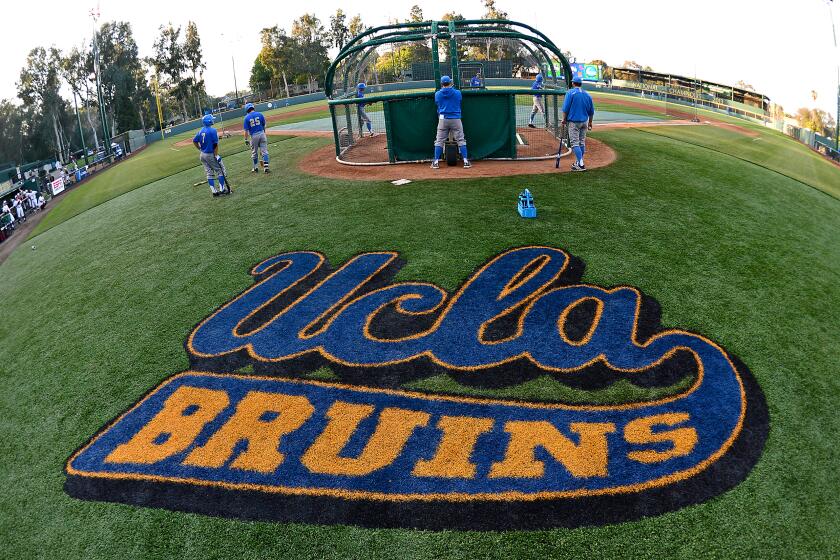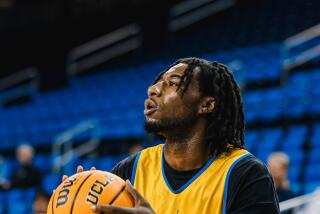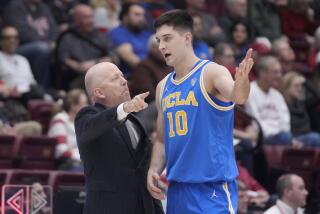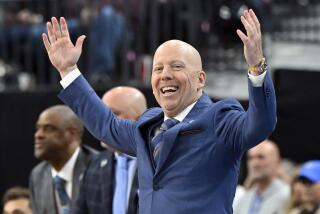Commentary: For this scribe, UCLA’s run was a Big Dance marathon, and the memory of a lifetime
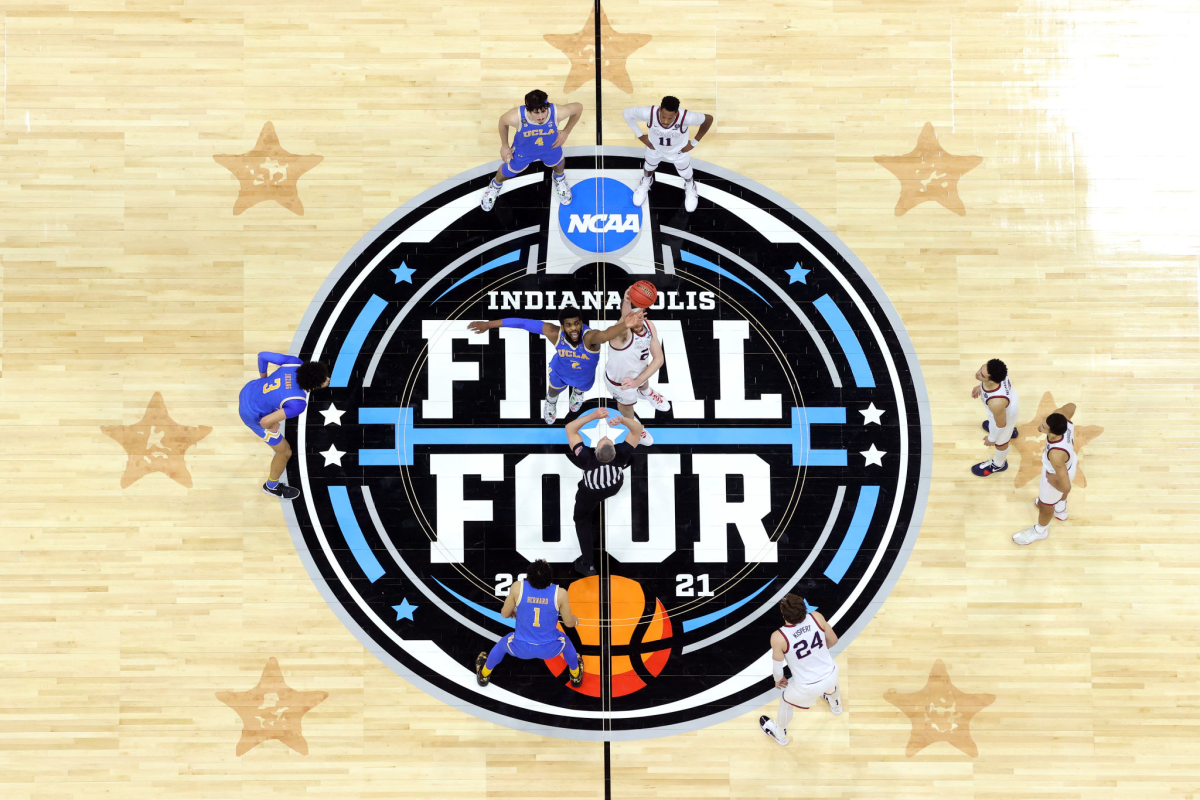
- Share via
There are 128 miles to go from Chicago, I’ve got a full tank of gas, half a Coke Zero, it’s getting dark and I’m wearing all black.
It was the start of an epic journey covering UCLA that could have ended on that first frigid night in what felt like the middle of nowhere. The Bruins had lost four consecutive games and were one of the last teams selected for the NCAA tournament, exiled to West Lafayette, Ind., for a dreaded First Four game against Michigan State.
My coworkers were covering the tournament from home, keeping their remote controls handy. But there I was, in my black Toyota C-HR rental car with a Florida license plate, careening over a ridiculously potholed Chicago Skyway while making the two-hour drive to Purdue’s Mackey Arena.
Starting Friday, UCLA could allow a limited number of team guests to attend outdoor spring sporting events as a result of updated pandemic guidelines.
Starting with the season opener in San Diego, I had made every sensible — and not-so-sensible — effort to see the Bruins in person. Being there lent an authenticity to the coverage, even amid a sea of fake fans. It meant hearing what coach Mick Cronin told his players in his more animated moments. It meant watching Chris Smith test an injured knee on an exercise bike.
And as UCLA prepared to face the Spartans in the heart of Big Ten country, it meant realizing the Bruins were in trouble before tipoff. A loud “Go Green!” chant broke out on one side of the sparsely populated arena, followed immediately by a “Go White!” retort across the way.
By comparison, the UCLA cheering section seemed confined to friends and family, vastly outnumbered even with capacity limited to 1,350 by health restrictions amid the pandemic.
The lopsidedness carried over to the game, the Bruins falling behind by 14 points late in the first half. Just as my story started to resemble an epitaph, with the opening scene about a Jules Bernard jumper that hit nothing but net — the front of the net — a rally commenced, sparked by defense and relentless effort.
By the time the Bruins completed that 86-80 comeback victory in overtime, I had highlighted the first five paragraphs of my story and hit delete three times. Not that the final version was a literary gem. The game ended just before 1 a.m. local time, pushing even the most forgiving West Coast deadlines that made it possible (barely) to get in the final score.
As the last Bruins reveler departed the court following a mad celebration, Semisonic’s “Closing Time” blared over the arena’s speaker system. It was the perfect theme for a team that was moving on from its recent doldrums, headed for the tournament’s most riveting run.
Closing time, every new beginning
Comes from some other beginning’s end
::
After returning the most overpriced rental car in the history of sports journalism, I checked into my new hotel the next morning in Indianapolis, never imagining it would come to feel like my new home.
Room 1426 of the Courtyard by Marriott resembled every other nondescript hotel room, with one exception: Housekeeping would service the room only once every five days amid the pandemic. It didn’t even take that long for the place to resemble a fraternity on the verge of being cited by the health department, empty soda bottles, pizza boxes and other food delivery cartons piled high.
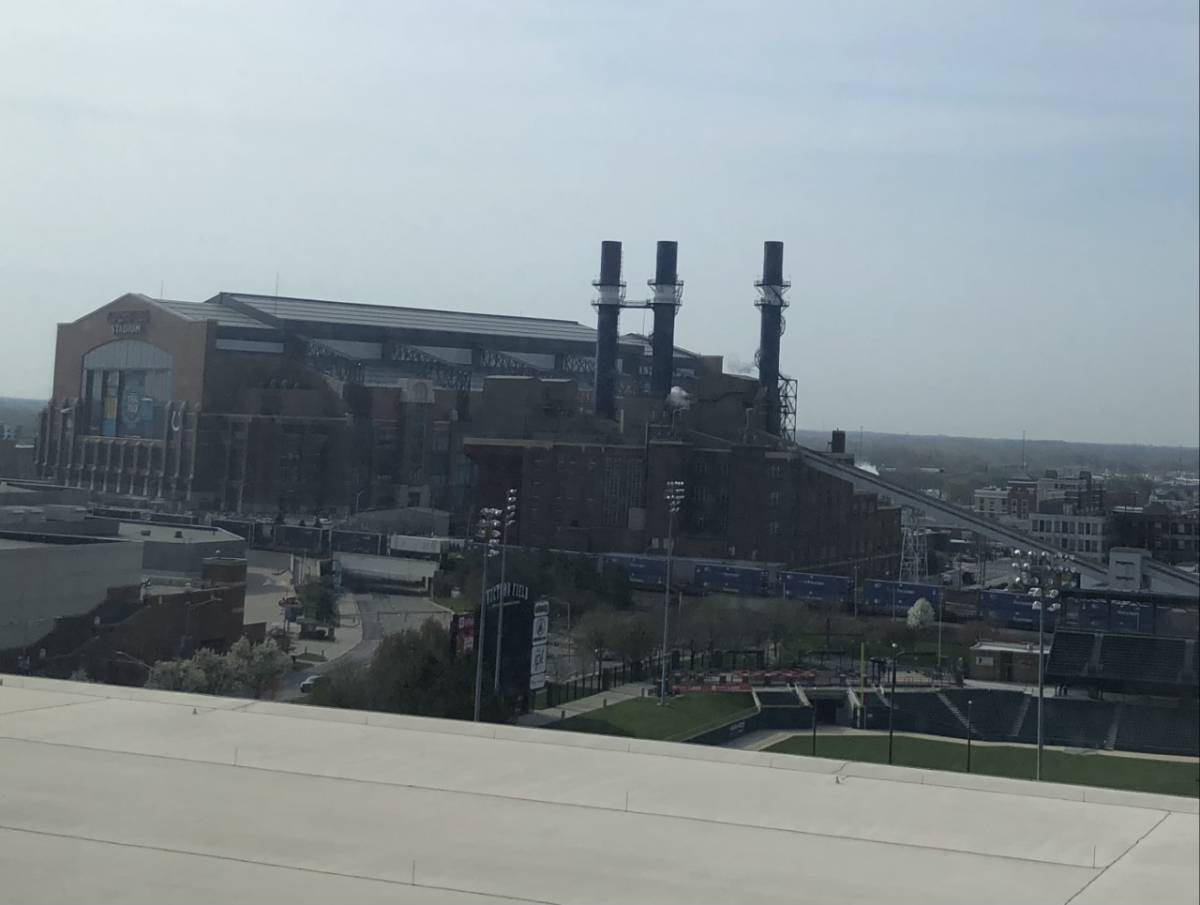
My morning routine was always the same, surveying the kaleidoscope of team colors fans displayed in the hotel’s hallways, elevators and lobby before heading down Washington Street for breakfast.
What made this tournament so fascinating was that it was staged in a central hub, allowing fans from every team to converge in the same place.
That was how I later ran into the father of UCLA’s Jaylen Clark walking alongside the parents of USC’s Ethan Anderson even though the Bruins were in the East Region and the Trojans in the West.
Just as I was starting to get a feel for the city’s top food spots (Café Patachou for breakfast, Bluebeard for dinner), I was also becoming a connoisseur of the basketball venues. Mackey Arena was a dilapidated dome, even if it did score points for the John Wooden statue outside. Bankers Life Fieldhouse featured all the charm of most NBA arenas, which is to say none. Lucas Oil Stadium provided the intimacy you would expect from watching a basketball game inside a football venue seating around 70,000.
That brings us to Hinkle Fieldhouse. The old basketball barn is so breathtaking you can get goosebumps gazing at its brick and stone exterior. It’s historic without feeling decrepit, oozing charm and vibrancy even when partially filled as it was for UCLA’s first-round game against Brigham Young.
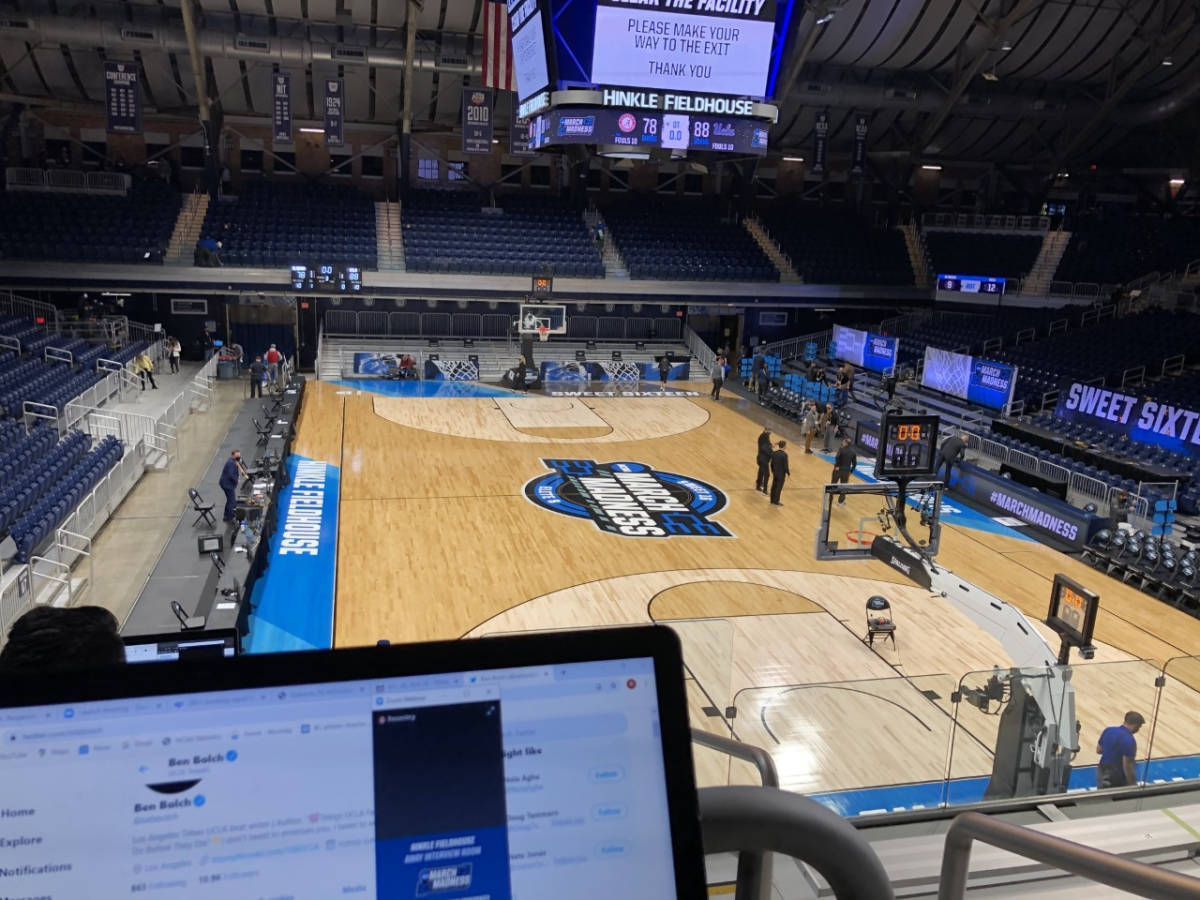
The place was rocking as Bruins guard Jaime Jaquez Jr. drove into the lane for a vicious dunk and ripped away a rebound from Matt Haarms, a Cougars counterpart nine inches taller.
After a late flurry of points, UCLA was moving on. It was another night to remember, made all the more so when my Uber driver who said he had lived in Indianapolis for 18 years glanced at Hinkle Fieldhouse and made me stifle a chuckle with his inconceivable query.
“What building’s that?”
::
Sportswriters root for compelling story lines, not the teams they cover.
UCLA-Alabama was the kind of game you might get to write about once in a career.
The Crimson Tide was heavily favored to end the Bruins’ fun run in a regional semifinal back inside Hinkle Fieldhouse after Abilene Christian had posed little challenge in the second round.
The game felt like an hourglass continually flipped upside down as the sand was about to run out. Alabama raced to an early lead, using its superior quickness for blow-by layups. Then UCLA’s Johnny Juzang and Bernard started sinking circus shots as the Bruins surged into an 11-point halftime lead.
Rousing its restless fans, the Crimson Tide rolled to start the second half, eventually retaking the lead. The Bruins countered and seemingly had the game won before Alabama’s Alex Reese buried a three-pointer to force overtime.
The five extra minutes were all UCLA. The Bruins were headed to the regional final against mighty Michigan inside Lucas Oil Stadium.
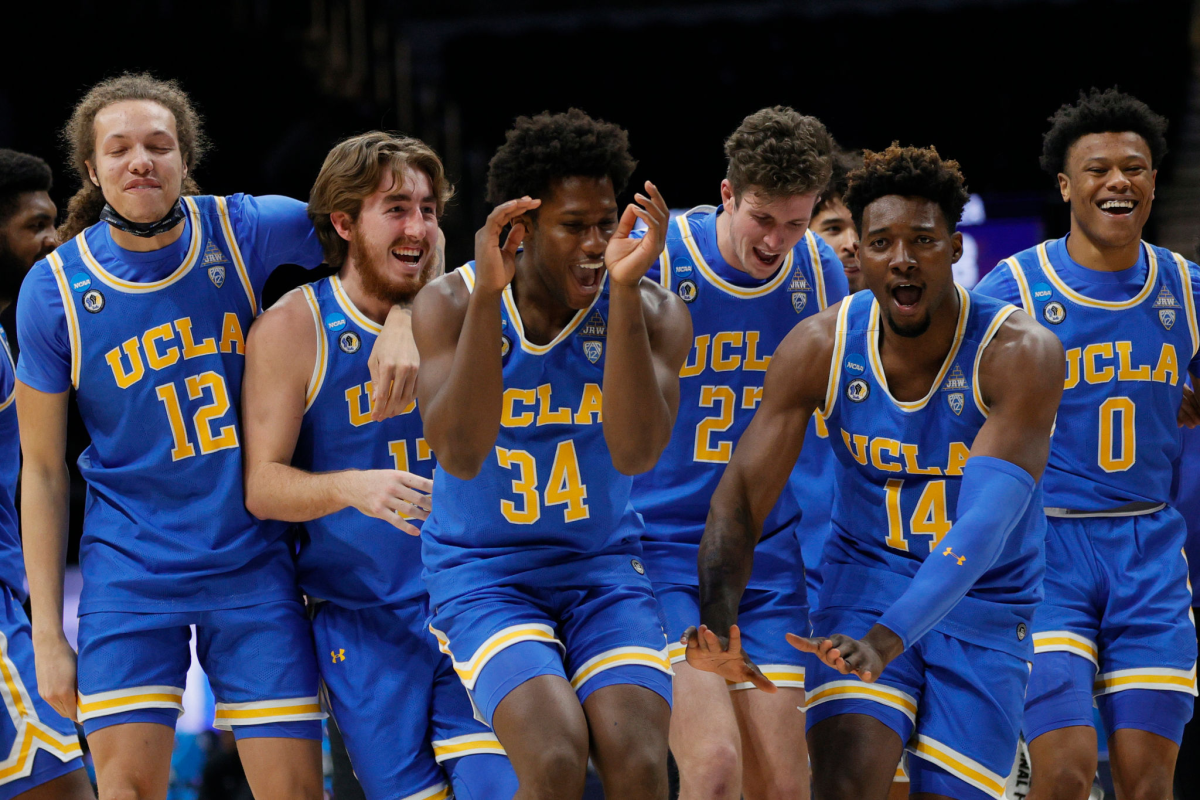
Seated in the third row behind a basket, it was the first time all season I had been on floor level with the Bruins. Every other venue had stationed the media in some faraway nook to protect the players and coaches from possible COVID-19 contamination.
This closeup view provided a reminder of how much these guys liked playing together. The Bruins pulled in tight for pregame hype huddles, bodies bouncing off one another in a joyous scrum, smiles all around.
Smith, the senior guard sidelined by torn knee ligaments, lingered on the court after warmups. He took on a student manager in something resembling a game of H-O-R-S-E, the classmates challenging each other to see who could make the craziest shot.
Once again, the analysts had predicted, the Bruins had no shot. The Wolverines were the top-seeded team in the East Region, too talented and too physical to be challenged by the 11th-seeded Bruins out of the finesse-oriented Pac-12 Conference.
Nope. The slugfest that ensued would bring more madness to March.
Hep Cronin, Mick’s father and the Bruins’ good-luck charm whose every fist pump was broadcast on national television, had predicted that neither team would reach 70 points; it looked like neither might get to 60 when UCLA took a 27-23 halftime lead on the strength of Juzang’s 18 points.
Michigan’s only answer for Juzang was an aggravation of his bothersome ankle early in the second half. But Juzang trumpeted his return a few minutes later, pounding his chest twice and sprinting to the scorer’s table to check back in.
His presence was pivotal when he scored the Bruins’ final points on a jumper and a free throw. Michigan missed its final eight shots, including a three-point attempt by Franz Wagner at the buzzer.
Less than two weeks after being considered a coin-flip to lose in the First Four, UCLA was headed to the Final Four.
Housekeeping would need to clean Room 1426 one more time.
::
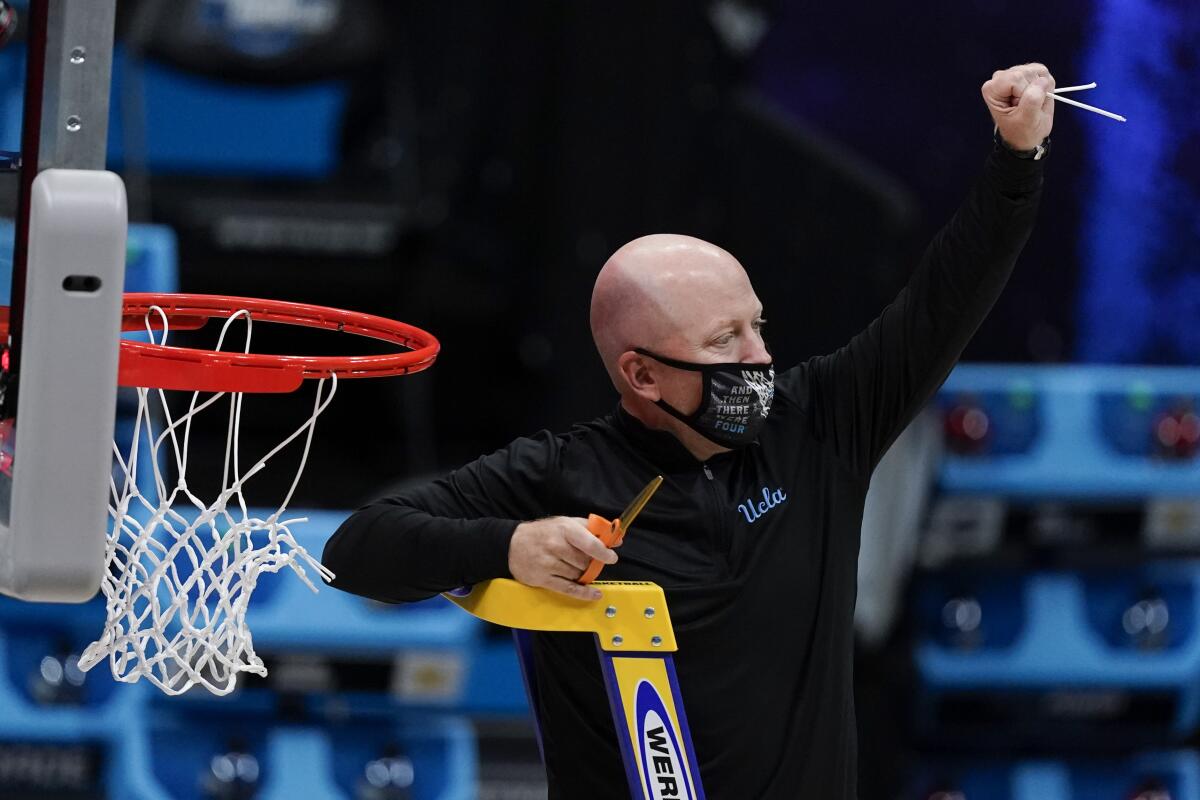
Mick Cronin answered on the second ring.
He had slept two hours when he took my call the next afternoon, his phone containing 670 unopened text messages.
“This is the only call I’m taking,” Cronin said, alluding to his singular focus. “Already on to Gonzaga.”
Having won five consecutive games, the Bruins felt like a team of destiny. Cronin compared his players — none of whom had previously played in the NCAA tournament — to a novice Las Vegas gambler on a hot streak.
“These guys, they think this is easy,” Cronin said with a chuckle. “You just go to the tournament, you go to UCLA, you go to the Final Four.”
Another omen materialized in the Bruins’ favor the day before they took on the top overall seed in a national semifinal. Tyus Edney, the darting protagonist of UCLA’s last national championship in 1995, walked into downtown hotspot Harry & Izzy’s, stopping by my table to say hello.
The game was one mad dash into overtime, the Bruins matching the Bulldogs with one awesome play for another, neither team taking control as a result of a dazzling showcase featuring more ties than Brooks Brothers.
Long after the breathless finish, two sequences would replay in my mind on an endless loop.

Highlights from the UCLA-Gonzaga Final Four game, which the Bulldogs won 93-90 overtime
The first came with UCLA’s Cody Riley powering toward the basket in overtime for what looked like it would be a go-ahead dunk. Gonzaga’s Jalen Suggs somehow blocked the shot, grabbed the ball and flung a daring bounce pass in transition that resulted in a Drew Timme dunk and celebratory mustache stroke.
The second was the stuff of dreams or nightmares, depending on one’s allegiance. With only three seconds left and the score tied, Suggs took an inbounds pass, dribbled three times and fired a 40-footer that banked into the basket at the buzzer.
Even my computer seemed stunned, crashing for the first time all season just as it was my turn to ask a question in the postgame interview Zoom.
“Please take yourself off mute,” the moderator said as I stared in horror at my frozen screen, unable to respond.
The season over, it was time to check out of Room 1426. After 18 nights, bidding farewell to the stack of musty towels on the bathroom floor qualified as my one shining moment.
The Bruins had provided more compelling copy than any beat writer could have imagined. Now it was on to filing the accompanying expense report while contemplating the end of a memorable run, and given the cost of that rental car, maybe the end of me.
More to Read
Go beyond the scoreboard
Get the latest on L.A.'s teams in the daily Sports Report newsletter.
You may occasionally receive promotional content from the Los Angeles Times.

